June 19 // war and rosés
So where were we? Ah yes, we were last sleeping among the flies above the parapluies of Laon.
Given my typical morning scramble to stuff my PVC packs, strap down my polyurethane Voilés, and lather myself in a combination of sunscreen and butt butter while a long-since-ready Mark looks on, I take advantage of last night’s sobriety to wake well before my biking companion in search of coffee.
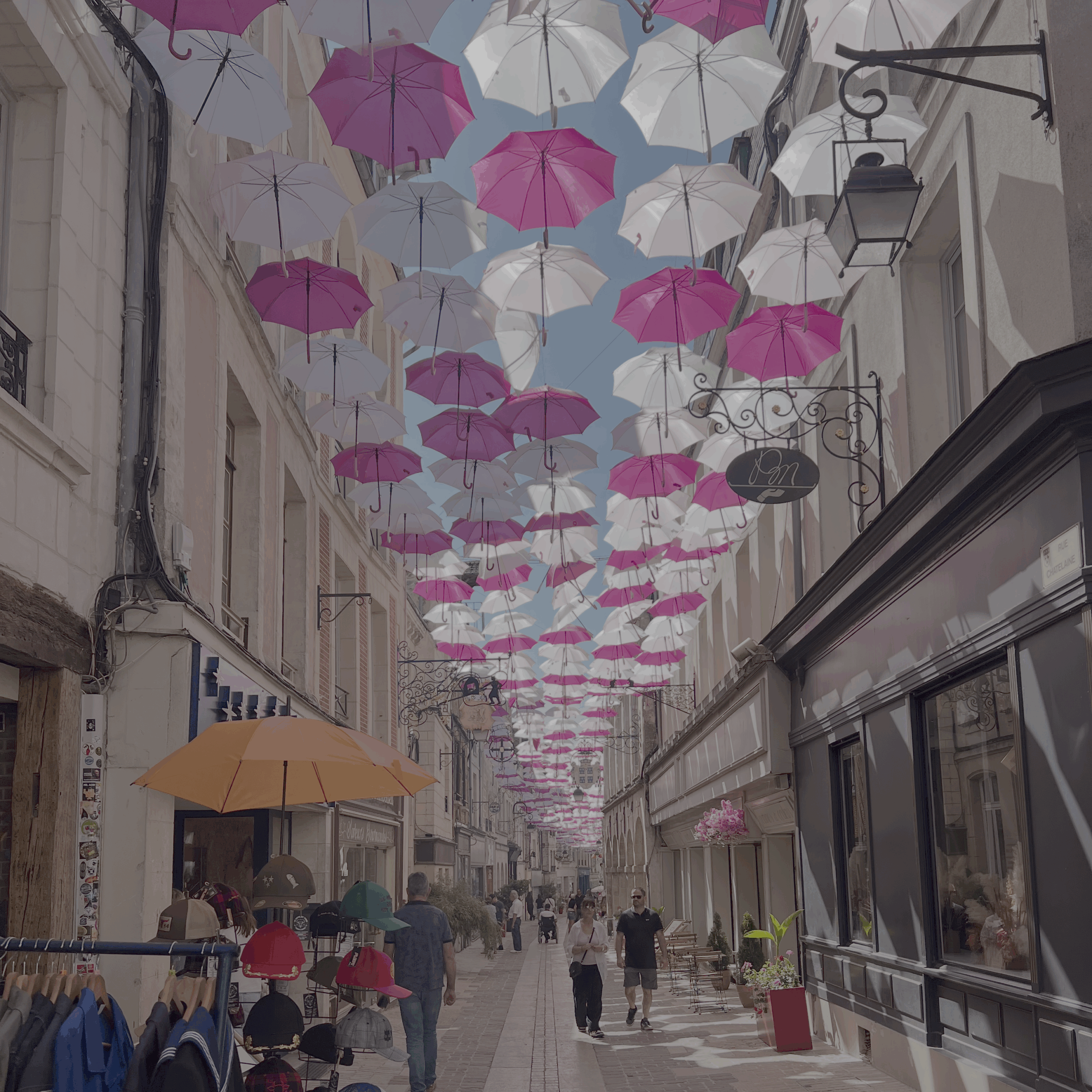
Reaching the bottom of the stairs in my spandex, I’m greeted by the fluttering eyelashes of Z, the young hotel owner whose prepossessing yellow-white sundress seems to flow freely even here in the heavy air of a hotel lobby that, in all its mirror-and-acrylic, looks like a modest, modern take on an 1980s coke den in Miami. Not that I have the slightest idea of what I actually mean by that.
Despite the five young children presently hanging from her arm and/or other arm, Z manages to point me toward the hotel’s coffee machine, then insists on joining me there so she might activate the pod herself.
“Avez-vous…bien dormi?” she asks, biting her lip with a note of nervousness. “You sleep well?”
I decide, in a show of my newfound resoluteness, to be honest for the first time in my entire life. “Pas bien,” I shrug.
I detect a pall of disappointment landing on her otherwise angelic face, like some kind of, uh, disappointing cloth typically spread over a coffin, hearse, or tomb. “It’s not your fault,” I add with great generosity. “Pas tu faute!” I explain, rather, that it was the appendage-dragging rhinoceri in the room above ours who spent much of the early morning shouting and scraping and calmly talking in the hallway who kept me from sleeping soundly, failing to add that in fact I’ve never slept soundly in my entire life, not even once.
“I shouldn’t have let them stay here, but, well, it was late, they needed a place to stay, and we really need the money,” she says with a cinematic sigh as another young child jumps onto her back, filling the only space on her person where a young child had not been. “Since my mother went back to Algeria, things have been very difficult. And just last week filled the lobby with water when the happy mint of two yolks.
It’s a compelling and heartbreaking story, to be sure, but it’s 7 in the morning and I’m still not sure I understand where I am.
“Our government hates Islamic people and small businesses,” M chimes in, scaring the shit out of me. M is Z’s husband, a shredded (but kind of short!) local firefighter who seems to have manifested from thin air in a white undershirt and jeans, like some archetypical French character in a stage play set in the 1950s.
“Oui, oui, je comprande,” I say in response, fully understanding. “Donald Trump voulez throw tout les foreigners dans un…un boulangerie,” I add, though I must admit I’m not entirely sure of the correct word for “oven.”
For what seems like an hour and is probably only 10 minutes, me, Z, and M engage a friendly but fiery conversation over which of our governments hates poor people more.
I nod frequently, adding d’accord, d’accord, at first feeling really quite good about my linguistic capabilities, but between M’s impassioned monologue on the shortcomings of the EU, not to mention what he believes to be a menacingly infectious shitstorm in Italy combining its geographical proximity to the African continent with a long-broken economy and a fundamental tendency to enact uniquely racist policies, plus the intermittent marital crosstalk he shares with Z while the little girl in the matching sundress keeps shrieking something and another one, the younger blonde one who had been sleeping on the couch to the point where she seemed dead but now won’t stop staring at me, I’m starting to wonder how much longer I can refrain from blacking out.
Thankfully, just in that little pocket of time, Mark himself descends from the stairs. For a moment, everything stops.
“Bonjour,” Z chirps, flashing him a warm smile. “Voulez-vous un café ?”
“Oh, I don’t speak French,” Mark says, reaching for a cup.
By the time we hit the road, stopping for another round at the world’s worst patisserie, it’s clear that I’d spent anywhere between 10 minutes and three hours down there. Chewing on a half-baked pain au chocolat, I glare at Mark. “Why couldn’t you have stepped in sooner?”
“Shut up, you love it.”
After surviving the extreme downhill on the back door out of Laon, our ride through the remaining countryside of Aisne brings us from medieval hilltown back to a lot more flat, dusty farmland where a moment’s exposure in the sun feels like a death sentence, and there’s not a square inch of shade to be found.
Shaky with thirst and, if I’m being honest, quite crushed by a string of multiple bad meals, we’re in need of something good and cheap.
Enter Arcadia.
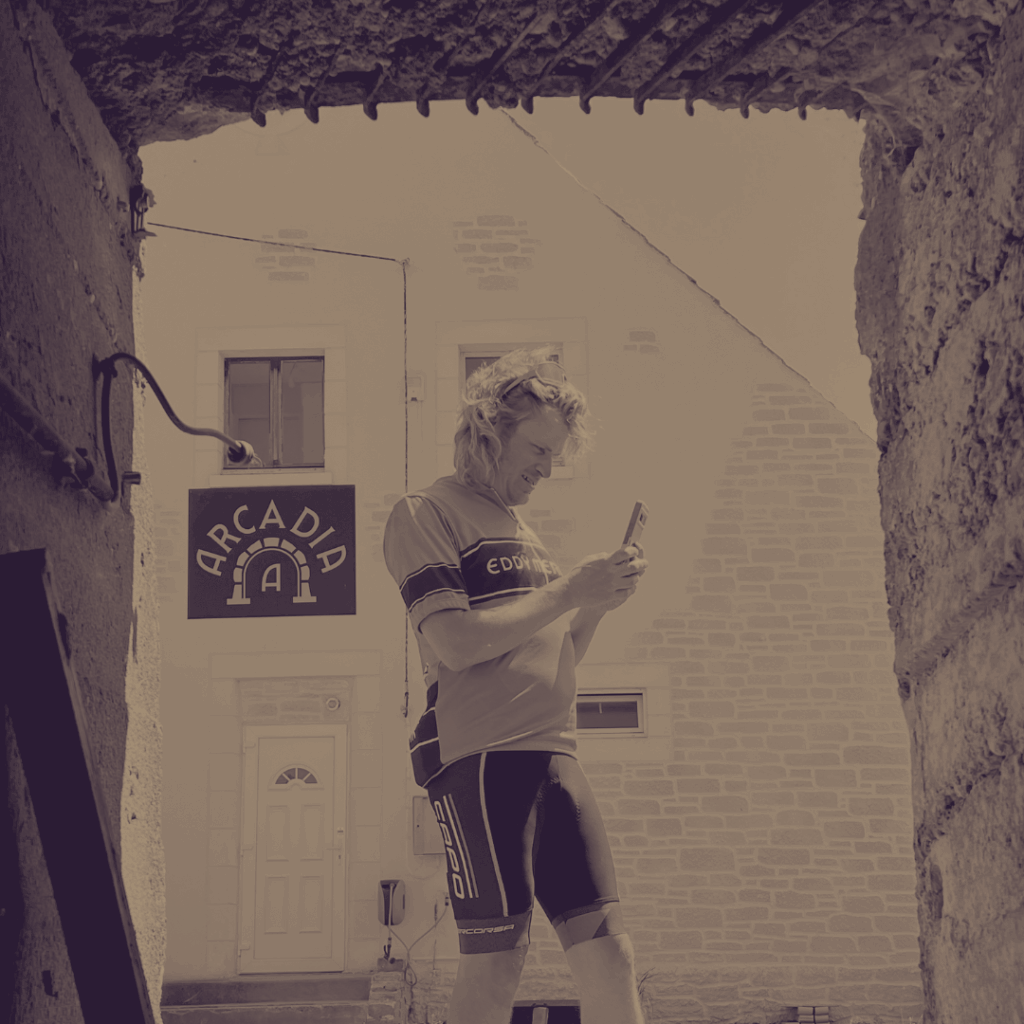
Neither a city in California’s San Gabriel Valley nor a mythical utopia (both of which would be difficult to reach by bike), Arcadia is actually a restaurant full of dour-looking old men in fluorescent vests (my favorite kind of restaurant; men; vests).
Our phones tell us that Arcadia is located in La Ville-aux-Bois-lès-Pontavert, but given that La Ville-aux-Bois-lès-Pontavert was completely wiped off the map by the Germans during World War I, it seems more appropriate to say that it is located on the side of a highway.
Nevertheless, I’d wager that it’s a contender for best meal of our trip thus far: I’m talking all-you-can-eat headcheese, pickles, salad, mustard, carrots, ham, mayonnaise. I’m talking rotini in shock-yellow sauce with baby shrimp and a hunk of boiled fish on the side. I’m talking a crisp ¼ liter of vague Bordeaux rosé and all the cold water and dry bread we can handle, and I’m talking €17,50 out the door, tip and tax infuckingluded. Nevermind that the pasta was mushy like mashed potatoes, the sliced tomatoes were as waxy as if they were from a Wisconsin Walmart, or that the shrimp were clearly from a can: we all know French food is overrated, but it doesn’t need to be overpriced, too!
More importantly, though, in its truck stop parking lot there lurks this little jewel from the Great War:
Achtung, Mark! Jesus.
Our bellies now full of questionable fish, we cross a few more miles through Berry-Au-Bac, where the first French tank — the Schneider CA1 — was used for the first time in back in Spring 1917. They were not successful.
Now in the Department of Marne, we mercifully spill out onto the Canal de l’Aisne à la Marne, a well-paved, well-covered 19th century waterway from which feels, with its leaf-dappled shadows shielding us from the sun, its waters so cerulean blue and viridian green, that it feels as if we’ve rolled right into an impressionist painting.
After battling — and perhaps this is a poor choice of words, given the context — such heat and hills, the Canal is an absolute pleasure, so flat and so cool.
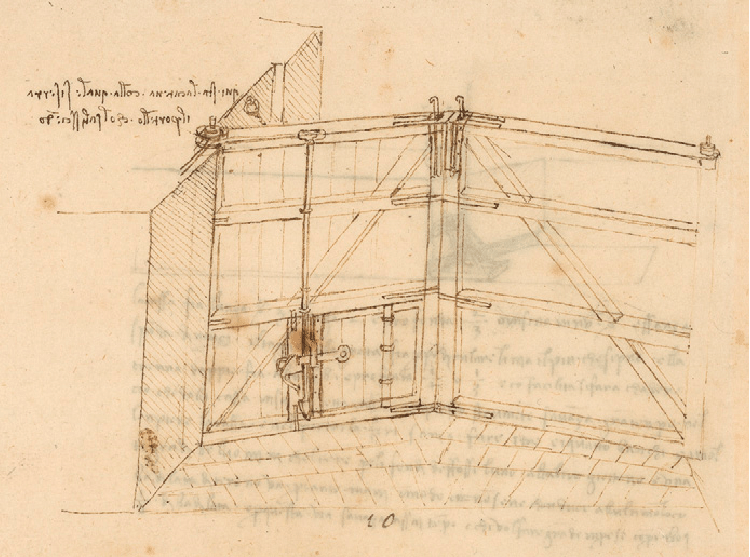
Have you ever seen a lock in operation? I realize now that I have not until this day! Its lights flash at the advance of a ship, and we pause to watch the pound fill, the miter gates ease open, utilizing an invention by Leonardo that remains predominantly in use today in canals all over the world, even in that of Panama (talk about a man with a plan!). As we catch our breath, a leisure barge eases through, its Belgian flag floating in the lazy breeze, and the wiry, wild-haired woman at its mast pumps her fists in the air in encouragement.
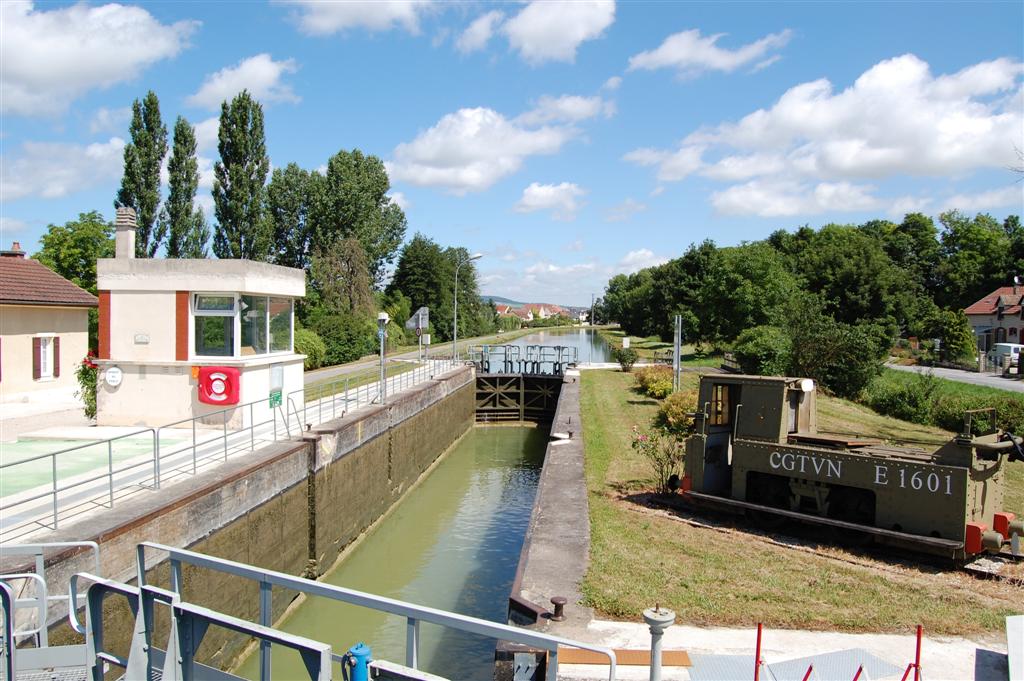
“Ahoy encore,” I shout as she hops around the vessel, lashing it lightly in place to the bank. She offers a few words back and I laugh, pretending to understand, until her tone indicates that a question has been asked and it’s my turn to respond. “Oh,” I respond, drooling on myself. “Répéter, s’il vous plaît ? Dialectes français ! They are difficiles pour moi.”
“I was speaking Flemish,” she retorts, waving goodbye.
Quickly, the canopy of trees opens up to reveal yet another massive, apocalyptically dormant factory of unknown function. Though common by now, each with its own streamlined corporate lettering there’s still something unsettling about these boys, their giant steel silos branded with streamlined corporate lettering stand up from shrapnel cocoons, chutes jutting out from their rusted bodies and sagging down almost post-coitally, capped at the tip with rubber caps that seem certain to splash down like discarded you-know-whats.
Even once we pass the industrial zone, a canal that once teemed with algae, fish, and flies is now clear as glass, every limestone brick of its bed visible but for the occasional chalky cloud of a provenance I’d rather not consider.
Gradually, the water widens into the more substantial Loivre River, carrying us alongside its namesake town.
Given its enviable location, Loivre seems to have once been a rather significant place: in the 19th century, a glass factory owned by the deliciously named Granrut Brothers once churned out millions of champagne bottles per year, and its reputation for its water was such that its citizens were, and still are, known as sourciers, and yet there’s nary a sourcier to see here.
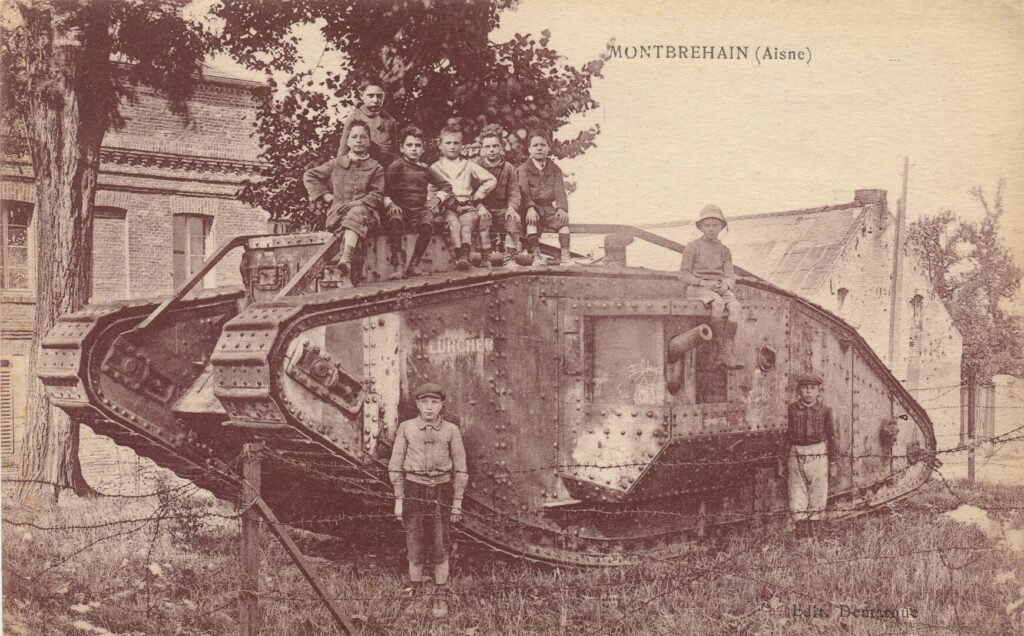
Like La Ville-aux-Bois-lès-Pontavert, and an ancient village named Sapigneul we’d passed by earlier, the Jerries wiped much of Loivre from existence, leaving nothing but new forest growing from the former trenches. Riding past the occasional riverside apartment built in the subsequent years, each invariably featuring a sun-bleached plastic table spilling with abandoned beer bottles and cigarette butts, it’s once again hard to recognize in this any of the beauty and romance so many of us associate with France.
I can only shudder to think about what the world would look like today if we Americans hadn’t temporarily suspended our moralistic commitment to neutrality in order to liberate Europe from the evils of war back in 1917!
And…wait, what? We had to do it again in ‘41? Liberating Europe (and therefore the world) twice?! And then spearheading and even hosting an intercontinental League of Nations United Nations devoted to sustained peace and goodwill on the global stage?? Wake up, world. Show us you’r graditud!
Nevermind the politics, however. When the time comes to abandon the Canal, as hard as that is, hills begin to congest the horizon line. Hills, plural! In France! Do you know what grows on hills in France? It seems as if finally what I’d intended to be a booze-based blog is finally about to enter boozeland.
Strap the fuck in, folks, as things are about to get disappointing.

